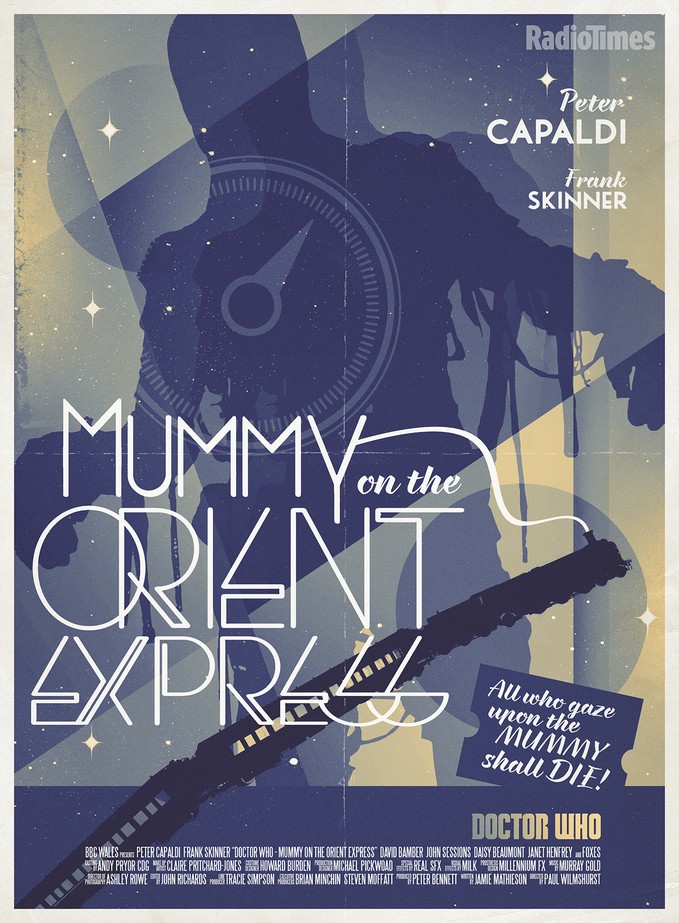
[via]
Glen here…
…with a Docback dedicated to Mummy on the Orient Express. This weekend’s installment will be the eighth of twelve Capaldi-era DOCTOR WHO episodes this Season/Series. This year’s Christmas special, which may or may not count as episode #13 depending on how you look at it, recently completed filming.
Mummy finds the Doctor onboard a space version of the Orient Express, grappling with a ‘Mummy.’
Whether or not this tale connects in any way to Matt Smith’s reference to a crisis on ‘the Orient Express in space’ (at the end to The Big Bang - the DW episode, not the TV series) remains to be seen.
THE OFFICIAL SYNOPSIS FOR IN THE FOREST OF THE NIGHT…
…the 10th episode of Season/Series 8. This synopsis is not substantively different from what we’ve heard before. Nonetheless…
One morning, in every city and town in the world, the human race wakes up to face the most surprising invasion yet.
Everywhere, in every land, a forest has grown overnight and taken back the Earth. It doesn’t take the Doctor long to discover that the final days of humanity have arrived…
IN CASE YOU MISSED MY TALKBACK POST ABOUT ROBERT DOWNEY JR EARLIER THIS WEEK…
Earlier this week, RDJ conducted a Reddit session to promote his new film THE JUDGE (opening this weekend). Out of the blue, the conversation turned towards DOCTOR WHO - at which point the actor revealed an interesting tidbit...
HORNORSILK REVIEWS THE MASK OF TRAGEDY BIG FINISH AUDIO
============

Big Finish 190: Mask of TragedyWritten By: James GossDirected By: Ken BentleyCastSylvester McCoy (The Doctor), Sophie Aldred (Ace), Philip Olivier (Hector), Samuel West (Aristophanes), Alisdair Simpson (Cleon), Russell Bentley (Tyrgius/Slave Trader/Boy), Tim Treloar (Telephus, Cisyphus/Old Man), Emily Tucker (Adonia/Lysistrata)Previously: the companion known as Hex died, with Ace furious with the Seventh Doctor over Hex’s death. And yet, when the Doctor went to oversee Hex’s funeral, Ace found Hex was back to life – but he had changed, for he had lost all his memories. He called himself Hector. There was a way for him to get his memories back, but that opportunity was lost, and it appears the new Hector persona is here to stay. Ace is not happy with this outcome, and believes there must be another way to restore Hex. The Doctor is not sure if he should even try, if it would be fair to Hector to lose who he had become to give someone else, a different persona, a new life. And so Hector joined the Doctor and Ace, only to find his first trip a disaster. The Doctor wants to help, and so he has decided to take Hector sight-seeing, to take him to ancient Athens, hoping it will give him some relief.This brings us to our new story, Mask of Tragedy. The title should give us a sense of what is in store: tragedy. While that is certainly the case here, it is much more. We have a dark comedy, one which mixes many themes of the current adventures of the Doctor together. Who or what is a person? What kinds of masks do we put over ourselves to hide who we are, even to ourselves? Do we let our mask, our new persona, take over, when we put on the mask, or do we put it under our control? These are rich themes, and for the most part, done fairly well, because it is not done in a preachy fashion, which is always a problem we have to face when dealing with them in stories. They are the rich themes of drama but they are turned into cheap clichés when used in second-rate drama.Here, we get something in between, and this is in part, because this drama borrows a great deal from another Big Finish story, The Kingmaker. Over the years, I have come to believe The Kingmaker to be one of the classic comedy stories of Doctor Who, with the closest televised example being The Romans and the best parts of Douglas Adams’ Doctor Who stories.The Mask of Tragedy continues where The Kingmaker left off: there are times and places where aliens and time travelers want to visit on the Earth, and their presence does not go unnoticed, indeed, their actions influence the very events such temporal travelers go to visit, often with comic overtones. The story changes, even if the ending stays the same. We see this idea explored further in Mask of Tragedy, where we see how such visitors affect 421 BC Athens, at the birthplace of Greek philosophy and theatre. It is not the question of King Richard and his nephews which draws people in, but the greater, and more difficult situation of Athens, ruled by Cleon the Tyrant while facing the military threat of the Spartans. Cleon, like so many others in Athens know of the alien presence, and despises them for interfering. He wants to protect himself and his image from them, but also from the comic mockery of Aristophanes. His anger with the time travelling visitors is that they come to visit, while they do nothing to help him and his cause; if they did, he would consider them his ally, but if they do not, he locks them up and has his fun with them. If Cleon’s temperament and the threat of the Spartans was not bad enough, there is yet another threat, a strange plague in the city, putting those who catch it into a zombie-like state. Cleon sees it connected to a sign, a flying fury which he feels is after him.Enter the Doctor, Ace and Hector. The Doctor thinks ancient Greece is the thing Hector needs. While Ace wants to find a way to have Hector restore his memories and become Hex, Hector wants to remain true to himself, to the identity he has, not from the past which he does not remember, but for the person he has become. He finds it difficult, because he does not really know who he is, even what he believes to be memories, he no knows were fake, and they are being lost like any other. What better thing can the Doctor do than to bring him to Athens, to enjoy the theatre, especially one written by his friend, Aristophanes?Now, the Doctor is not only friends with Aristophanes, he is Aristophanes’ major source of funding, being the client behind the playwright (ingeniously using hints of history to create this story, even as we find Aristophanes’ plays influencing what takes place as well). Aristophanes, like Cleon, knows about time travelers, and has had a few come and visit him, but for the most part, he feels they do not appreciate him as they should. Nonetheless, when he finds one such visitor is an alien beetle-like creature who has a mask he can use to appear human, it does not entirely take him by surprise. The mask is taken by Hector, who puts it on and finds it has other powers, powers which might just lead Hector into tragedy.Ace finds herself thrown out of Athens and so casts her lot with the Spartans.With so much chaos all around him, will the Doctor be able to save Ace and Hector while keeping history pure?There really is much to enjoy with this story. Aristophanes and the Doctor work great together, leading to a lot of unexpected humor. James Goss has done his homework, having reread the plays of Aristophanes, and it shows throughout the story. This is one of the many strong points with this story. Aristophanes is used as a historical person as well as a source of ideas for the story about him.Cleon, though not as exceptional as Aristophanes, is also done fairly well. He is given his own, more darker humor, while he is also more of a classical villain, with his role as tyrant taking considerable effect on how he acts. Comparing him to Richard the Third in The Kingmaker, Cleon is what the Doctor thought Richard would be like, making for a darker character and disastrous storyline than in The Kingmaker.The humor of having Ace join with the Spartans includes a few surprises which I do not want to ruin, including the sequence which led her to be thrown out of Athens, though in the end, I think the surprises stretch credibility and the Spartans are the least realized aspect of this story, hampering the credibility needed to raise this story’s rating to the level of The Kingmaker. If the story didn’t deal with them beyond an existential threat, and Ace had something else to do, I think I would have liked this story more; as it is, I found them annoying, though not completely without merit (there are a few good lines which emerge from their presence, but far fewer than is needed to justify their use).The real lead is Hector. The first half of the story comes, in part, from his talk with Cleon. And I like that storyline and what happened to him, and what he was presenting himself to be to Cleon only to find out the terrible consequences of his actions. The implications of Hector’s incomplete personality play a big part of the story. Since he is not entirely himself, he can merge with other personalities, other identities, causing great problems for himself and others. The mask does him good and ill, giving him a great triumph and downfall at once. And yet despite not wanting to be Hex, despite not thinking he is as good as Hex, he proves he still has Hex’s heroic heart within him; it comes out, even if half-confused, exactly as it should. If we had a few more stories like this for Hector, it would have been able to make an interesting turn of events and make the Doctor’s questioning of what he should do with Hector all the more relevant.While not exactly classic, this is a very enjoyable story. I expect when I listen to it again, I will appreciate it more, just as I did with The Kingmaker, though not as much as The Kingmaker, because what I like most about the Kingmaker is the crisis test Richard made for the Doctor, with the impossible choice being put on the Doctor and not his companions (like we saw in Kill the Moon). Richard in many ways was shown to be the Doctor’s manipulative equal, something which is rare to see in Doctor Who. Even though there is no equal to Richard, it does not need to be here, for this really is not the story of the Doctor but of Hector.For now, I give this a 7.5/10 but think it will become a true 8/10 for me when I listen to it again. This story, while mostly a comedy, still has a touch of tragedy, it’s darker, and while that’s welcome, I do think it doesn’t mix as well here as it did in the Kingmaker.
The Mask of Tragedy is available HERE.
============
————
Glen Oliver
“Merrick”
DOCBACK CODE OF CONDUCT
1) a Docback should be about completely open and free discourse regarding all things WHO with, obviously, some variation on subject matter from time to time - the real world intervenes, discussions of other shows are inevitable, etc....
2) converse, agree, disagree, and question as much as you want - but the freedom to do so is NOT a license to be rude, crass, disrespectful, or uncivilized in any way. Not remaining courteous and civil, as well as TROLLING or undertaking sensational efforts to ignite controversy, will result in banning. Lack of courtesy may receive one (1) warning before a ban is instigated. Obvious Trolling or Spamming will result in summary banning with no warning.

[–]Robert_DowneyJr[S] 2262 points 2 days ago